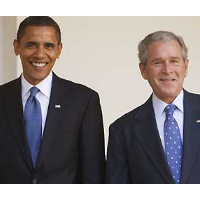Reagan-Appointed Judge Blasts Obama for Abuse of Executive Power Regarding Guantánamo Prisoners

Despite his 2008 election campaign promises to close the extra-judicial prison at Guantánamo Bay, Cuba, and to run the fight against terrorism in a more constitution-friendly manner, President Obama has embraced draconian policies—including indefinite detention of Americans without trial and life imprisonment for Guantánamo captives without trial—that are indistinguishable from those of George W. Bush. Last week, for example, Reagan appointee U.S. District Judge Royce Lamberth blasted the Obama administration for its “untenable” attempt via unilateral executive power to hamper the ability of the 168 Guantánamo Bay captives to talk to their attorneys.
The detainees’ right to legal representation was recognized by the Supreme Court’s decision in Boumediene v. Bush (2008), as part of their constitutional right to challenge their captivity by filing habeas corpus cases. Judge Lamberth noted that this remedy would be empty without access to legal counsel, because the prisoners “speak no English, have no legal training, and … cannot be expected to remain up to date with new legal and political developments.”
In fact, in 2008 Judge Thomas Hogan, who like Lamberth sits on the District Court for the District of Columbia, issued a “Protective Order and Procedures for Counsel Access to Detainees” governing how lawyers for the detainees could access classified information needed for their cases. The government never challenged those guidelines or asked for them to be altered.
Instead, this past summer the Obama administration issued a document purporting to replace Judge Hogan’s order with far more restrictive rules, which it misnamed a “Memorandum of Understanding (MOU).” That phrase is used to describe agreements reached between two or more parties, not a document unilaterally promulgated by one of them.
Under the Obama MOU, counsel for the detainees would be unable to access classified information, Guantánamo officials could cite “operational needs and logistical constraints” at any time to prevent a detainee’s access to lawyers, and Guantánamo’s military commander would have “final and unreviewable discretion” to enforce the MOU.
Slamming the last provision, Lamberth wrote that “If the separation-of-powers means anything, it is that this country is not one ruled by executive fiat. Such blanket, unreviewable power over counsel-access by the executive does not comport with our constitutional system of government.”
The Center for Constitutional Rights (CCR), which represents several captives, was pleased by the decision. “Today’s ruling reaffirms that constitutional rights are not subject to the whim of the executive,” said CCR executive director Vincent Warren. “The court has correctly recognized the government’s attempt to restrict attorney access to the men at Guantánamo as the latest in a ten-year history of successive efforts to ‘delay, hinder, or prevent access to the courts.’”
-Matt Bewig
To Learn More:
U.S. Policy for Guantanamo Lawyers Is Abusive to Detainees, Judge Finds (by Adam Klasfeld, Courthouse News Service)
Detainees Prevail in Counsel Access Dispute (by Wells Bennett, Lawfare)
In Re: Guantanamo Bay Detainee Continued Access to Counsel (Hon. Royce Lamberth) (pdf)
Obama Signs into Law Indefinite Detention of Americans without Trial (by David Wallechinsky and Noel Brinkerhoff, AllGov)
Obama Approves Life Imprisonment without Trial for Guantánamo Prisoners (by Noel Brinkerhoff and David Wallechinsky, AllGov)
- Top Stories
- Unusual News
- Where is the Money Going?
- Controversies
- U.S. and the World
- Appointments and Resignations
- Latest News
- Musk and Trump Fire Members of Congress
- Trump Calls for Violent Street Demonstrations Against Himself
- Trump Changes Name of Republican Party
- The 2024 Election By the Numbers
- Bashar al-Assad—The Fall of a Rabid AntiSemite






Comments